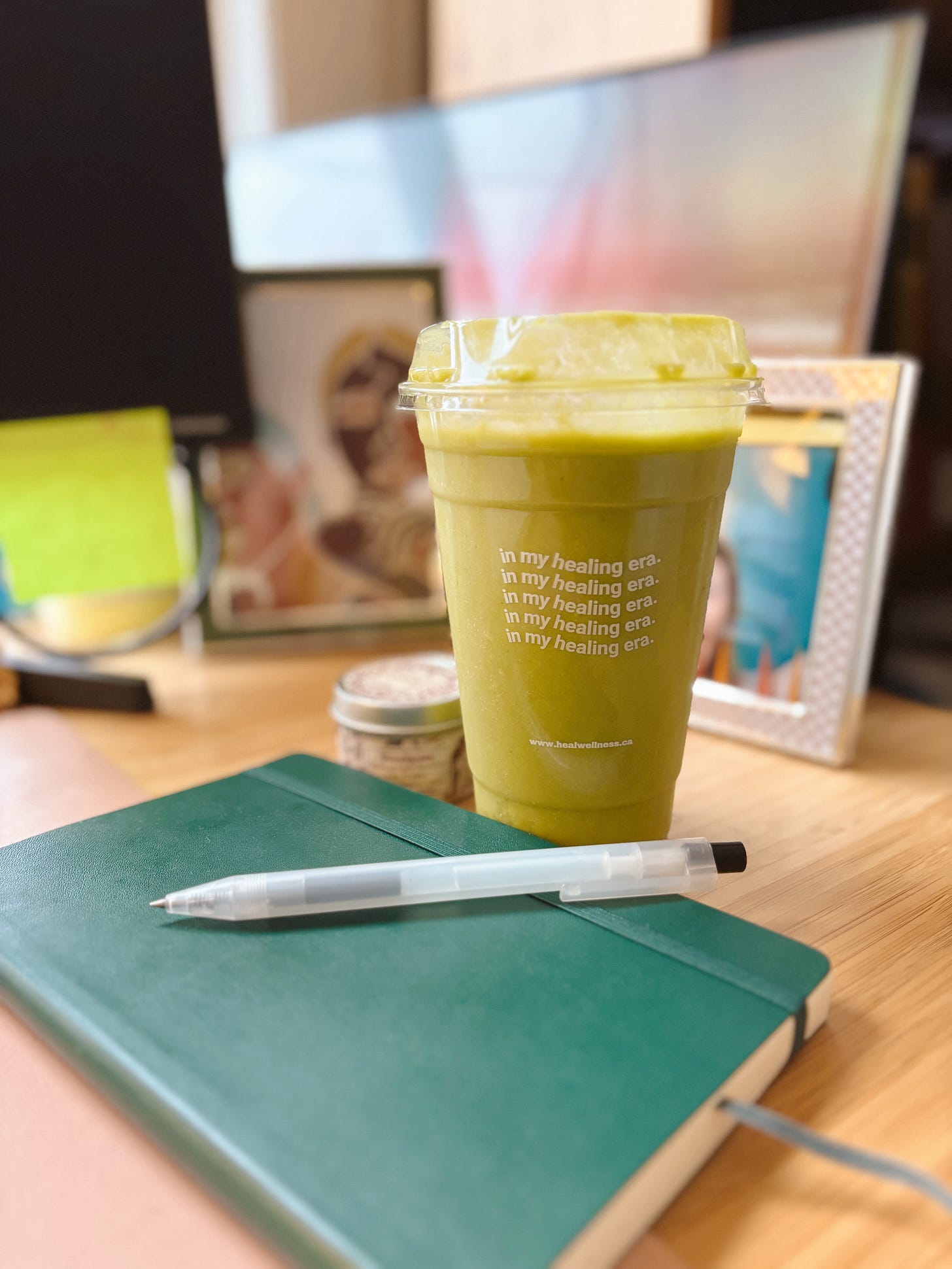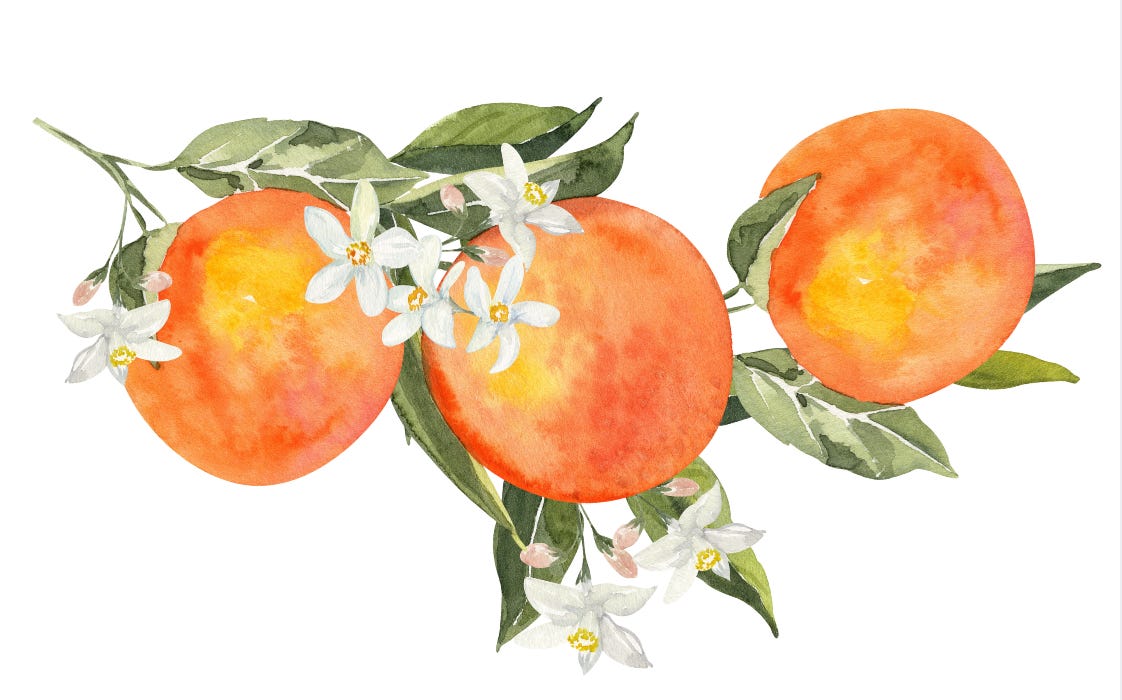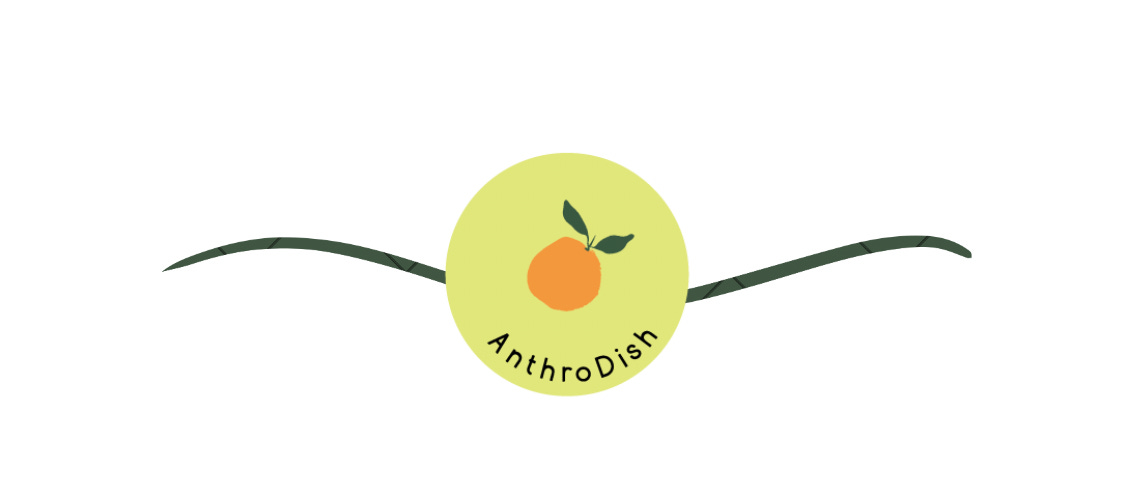Rituals feel alight this time of year, like they’re trying to harness the magic of a holiday season. The energies of people coming together over warm plates and glowing lights amidst the darkest days of the year. Channeling all of that to bring into the blues of January.
I feel like a scribble trying to burst through a haze. Years have been spent in the mists of grief, birth, and hormonal tides. I chopped my hair and painted it back to its original colours, my namesake Duignan. I finally lined my appearance up with its roots, Ó Duibhgeannáin: dark-haired, black-haired, brown-haired. Though if I dig too much, the stories of my last name change on the internet: nothing to do with hair, just being dark and sword-like.
I’ve spent many months searching through family photos, trying to tether myself to my now shaky past. I’ve been fearful that with each death, my grasp on family lines will disintegrate entirely — maybe it just means I heard too many “ashes to ashes, dust to dust” verses as a kid in church.
I’ve been wanting to shake the dust lately.
I watch a fitness instructor online adorn her long hair in natural oil, drenching and slicking back and preparing for sweat. These are rituals I follow, too, albeit in much more cramped and impractical spaces.
Last year I dismissed modern rituals as mere commodification, buying what we can to slap on our hair, faces, and butts in search of salvation through products. I still feel that’s somewhat true, but what then of my candle lighting? Each time I light one, I think of who’s left me, and I hope for who’s still here, and I sit in the moment. It’s the cultural Irish Catholic in me, despite my otherwise firm agnosticism. What of the five minutes of my day where I pay an app to teach me a language that was stolen from my nana? When I hear the words roll off my tongue, feeling as natural as a knife in warm butter: aon scéal, a chara?
In Cultish: The Language of Fanaticism, Amanda Montell explores the concept of ritual through a more powerful religious lens. She argues that a lot of social community-forming can be cult-ish through language. Shaping a time through a ritual allows for a “metaphorical domain” where certain language is appropriate:
To enter ritual time, some symbolic action typically must take place, like singing a song, lighting a candle, or clipping on your SoulCycle shoes (really). Rituals like these signal that we’re separating this religious thing we’re doing from the rest of our daily life. And there’s often an action at the end, too (blow out the candle, repeat “namaste,” unclip the shoes) to get us out of ritual time and back to everyday reality. There’s a reason the word “sacred” literally means “set aside.”
I get squeamish at the thought of participating in a religion of any sort. But when I ritualize my routines, life feels momentous, tethered to a good weight. It doesn’t matter which moisturizer I use, really, for it’s a moment I’ve reclaimed for myself amidst “critical path” Teams messages, progressions, splits, and other nonsense words clambering around my day. Amidst spit ups, Minecraft meltdowns, and salt-bombed dinners, I make space for myself and find its necessity through small ritual.
In The Anthropologists, Ayşegül Savaş’ characters describe their daily lives through ritual:
“While he made breakfast, I made a pot of coffee and sat with him at the table in pajamas. It was a ritual of sorts, sitting across from each other, face-to-face. There were few rituals to our lives, certainly none that carried any history, at least not the history of traditions, of nations and faiths. So these small things mattered. I would make sure to sit with him at the table.”
I wonder these days about the importance of these small things, these rituals removed from the history of traditions. When the world is aflame and whatever tenuous grasp we had on it dwindles further, perhaps this is why we return to small rituals. Lighting a candle, spraying a perfume, clicking the back of your foot two times before starting your next weight set.
Rituals, by anthropological standards, feel spellbound, a way of exoticizing others for white gain. In Julia Armfield’s Private Rites, she describes rituals as “like a tested recipe. People love a ritual when things get hairy, to feel they’re doing something that thousands of people have done before them.”
I spent my twenties lost in difficulties, trading what felt most precious to my sense of self in favour of survival. I left behind kayaking, good fiction books, and laughter to ensure my daughter and I found a safe place to land one day. I’ve finally carved something for myself and my family that feels buoyant, hopeful. I’ve sat with who I was after the 2016 American election, where shock coursed through my body. This time, I felt braced: there were voice notes with friends and family, grimaces and baked goods, and the sentiment that no matter what, we have each other. We have our legacies; what we savour of our lives to teach our daughters with one day. Our sons, too – arguably more important to ground them in matriarchal stories.
I meet a friend for coffee, and we sit over avocado toasts and last visits before departures remarking around the strangeness of religion and its hold on this city. Specifically, that it percolates around the behaviours of many in WASPy, regressive, quiet ways. We talk of different rituals, aiming to make sense of being brought up religious, the solemn space that a Sunday church service can provide as one of the foundational rituals to society. It’s a tightrope, we both admit, because of our own histories. We’ve both long since left our churches, hers Baptist, mine Catholic.
There are depths to the pain that both bring, of course. There are plentiful reasons we left. But the ritual, the sit-knee-stand-sing-sit-repeat of a Sunday, I’m sure there’s still solace in that for many. I am never one to criticize those who practice, knowing it offers them a peace or comfort in a difficult life. The only community I could find to support my grief existed in a large, lakeside Christian church. Their values weren’t explicitly present in the meetings, but that’s where the rented room for our free program was, the chocolate cake funded by the wallets of fundamentalists.
All this complaint of no third spaces under capitalism, and yet here I was every Wednesday, crying into Christian Kleenex. Where does ritual end and violence begin? Neither of us had answers that day.
My new year’s rituals are a reminder for building a life, keeping a home. In M.F.K. Fisher’s The Gastronomical Me, she describes the women that decorated her childhood through their rituals:
“Women in those days made much more of a ritual of their household duties than they do now. Sometimes it was indistinguishable from a dogged if unconscious martyrdom. There were times for This, and other equally definite times for That. There was one set week a year for “the sewing woman.” Of course, there was Spring Cleaning. And there were other periods, almost like festivals in that they disrupted normal life, which were observed no matter what the weather, finances, or health of the family. Much of them seem odd or even foolish to me now, but probably the whole staid rhythm lent a kind of rich excitement to the housebound flight of time.”
I think about this in relation to the Martha Stewart documentary, where she speaks to the idea of keeping a home. I can hear the hunger she has for keeping stability, security, or crafting a Something out of a Nothing. These sorts of home-keepings speak to me, the only sort of domesticity I’ll entertain.
Now that my life is more rooted — working from home, living in the same rental for nearly four years after many apartment-hops, grounded with the reality of a baby — I have more pause, more ability to notice the smaller rhythms in life. I know what time that guy down the street leaves to catch his bus, when my neighbour walks her tiny dog, when the squirrels will come and rifle through our back deck vegetable garden each day.
On TikTok, Taylor Nardone pops up on my FYP and speaks about keeping lists of when it goes right. Of seeing the glimmers, which are the beginnings of hope. I think about that more and more: after so many dark periods of life, I so badly needed a reset. I saw that clear path many poets looked at and wrote of before me, of leaning either to misery and getting swallowed whole, or of searching for those glimmers and persisting forward.
I gift myself ways to enrich my writing, my inner life. Buy courses from food writers I adore, to learn and think in a different setting. Stay a student for the rest of my life. A student of what may change, but curiosity is important to kindle. My skincare routine before bed. The quiet of oiling my hair before a workout, before a shower. Ordering a matcha green smoothie with a scoop of vanilla-flavoured plant protein at a juice bar after my weightlifting workout (I can make it, but sometimes it just tastes better there). Taking frozen bananas out of the garage freezer to bake into something later.
These can be read in multiple ways, I’m sure some more scoff-worthy than others. But those are moments where I’m taking care of myself when I could ignore myself. Moments to set an intention for my future self to grapple with. Building small hopes into my own future, reminding myself to keep working — not towards self-improvement so much as doing better for the next generation, or the generation after that. We get so caught up in climate doomism that we forget there will still be someone that comes after us, someone worth fighting for. We owe them our best selves fighting for them.
I see doomism as a form of privilege – that you can give up fighting, because it’s theoretical to you rather than tangible and life-threatening. If I were to give into doomism, lean into the story of who I look like on the outside, I may not have ever found the courage to get up each day.
But those glimmers, those rituals, those small moments pull me toward a future I want to live in. A future who is challenging, and likely violent, heartbreaking, and too hot. But a future nonetheless, and one we still can imagine about, to work with our communities to create small shifts toward. Hope isn’t cockeyed optimism so much as the willingness to keep fighting, keep showing up where it counts.
Rituals, nuanced out of the capitalistic parts, are part of weaving that fabric that grounds an imagined future for me.
AnthroDish Essays come out biweekly on Sunday mornings. If you’d like to support my work, paid subscriptions are $30 USD per year (or $5 USD monthly). Paid subscribers receive two additional Sunday newsletters per month: an AnthroDish interview transcript and a round-up of recipes, books, and shows of the month.
You can find me on Instagram, Threads, and TikTok, or check out AnthroDish podcast on iTunes, Spotify, and YouTube.










This is beautiful, thank you. The word hope has always been important to me, and I love your definition of it. My nightly skincare routine is also a way to take care of myself after a day of taking care of others! It's a moment to pause. Thanks for making me think about the word ritual in a different way.
Beautiful 😊 I've been thinking a lot anojr ritual lately, how critical it is to our individual wellbeing and to social cohesion, but also how it can go askew. Love this essay, thank you for sharing